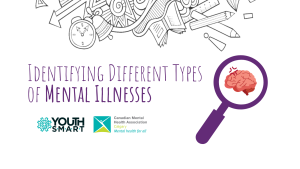Types of Mental Illness
There are many different types of mental illnesses and they affect everyone in different ways. With each type of mental illness, people may have unique experiences and challenges.
Health professionals divide mental illnesses into groups based on the emotions, thoughts and behaviours a person is experiencing. Some groups of mental illness include:
- Anxiety disorders (i.e. obsessive compulsive disorder): Anxiety disorders are all related to anxiety. They may include excessive and uncontrollable worry, strong fears around everyday things or situations, unwanted thoughts, panic attacks, or fears around a past scary situation. Anxiety disorders are the most common mental illnesses, and they can create barriers in people’s lives.
- Mood disorders (i.e. depression, bipolar affective disorder): Mood disorders all affect a person’s mood—the way they feel. This can affect every part of a person’s life. When someone experiences a mood disorder, they may feel sad, hopeless, tired, or numb for long periods of time. At times, some people experience an unusually ‘high’ mood and feel powerful and energetic, but this can also create problems.
- Eating disorders (i.e. anorexia, bulimia, binge eating): Eating disorders really aren’t about food. They are complicated illnesses that are often a way to cope with difficult problems or regain a sense of control. Eating disorders may include seriously restricting how much food a person eats, bingeing, or purging food.
- Psychotic disorders (i.e. schizophrenia, psychosis): Psychosis is a health problem that affects how people understand what is real and what isn’t real. People may sense things that aren’t real or strongly believe things that can’t be real.
- Personality disorders (i.e. borderline personality disorder): Personality disorders are patterns of thoughts, feelings, and behaviours that may last for a long time and create challenges in a person’s life. People who experience personality disorders may have difficulties developing healthy and satisfying relationships with others, managing their emotions well, avoiding harmful behaviour, and working toward important life goals. Personality disorders can affect the way people understand and view themselves and others and cope with problems.
- Childhood onset disorders (ie. ADD/ADHD): This is a large group of mental illnesses that start to affect people when they are young, though some people are not diagnosed until they’re older. One example of a disorder in this group is attention-deficit/hyperactivity disorder (or ADHD), which affects a person’s ability to focus, complete tasks, plan or organize, sit still, or think through actions.

